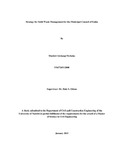Strategy for Solid Waste Management for the Municipal Council of Embu

View/
Date
2013Author
Muchiri, Gichangi N
Type
ThesisLanguage
enMetadata
Show full item recordAbstract
The purpose of this study was to evaluate the sustainability of solid waste management practices
for the Municipal council of Embu and develop a solid waste management action plan for the
local authority.
This research applied a framework on integrated sustainable waste management (ISWM) to
select the solid waste management (SWM) actors, system elements, sustainability aspects, and
indicators relevant at a local Authority level. These provide the basis of the fieldwork which
seeks to explore the sustainability of adopted Local Authority based waste management
interventions, within the Municipal Council of Embu (MCE). In-depth interviews, site visits and
review of secondary data are used for data collection. Respondents included households, local
authority staff and other relevant government officials from MCE.
Some of the key findings from field work reveal that there is no existence of important
partnerships or networks forged by the MCE within Embu and its environs which are considered
necessary to provide avenues to address certain issues pertinent to an ISWM system.
The residential solid waste generation rate was found to be 0.57 Kg/person/day, totaling to
approximately 9,344 tonnes per year out of which only 15% is collected and transported to the
dumpsite annually. On average the composition of residential waste in Embu constituted 52.5%
organic/biodegradable waste, 10.4% paper, 15.8% plastics, 3.4% glass, 2.2% metal and 15.7%
others. The results revealed that the socio-economic status of the people influenced the
generation rates and even waste characteristics. MCE generates about 9,266 tonnes of nondomestic
solid waste out of which only 64% is collected and transported to the dump site
annually. The waste composition varied with the source of sampling and the type of generator.
The research goes further to propose some recommendations for consideration by a way of
action plan. There is also the issue on the need to address an emerging grey area with regards to
the SWM permit and license issued by NEMA and MCE respectively. Both legal documents are
required by solid waste managers, but they address the same issue. In addition, a
recommendation to establish a general but standard quantitative approach to measure in how far
SWM systems are sustainable is proposed.
Citation
Department of Civil and Construction EngineeringPublisher
University of Nairobi
